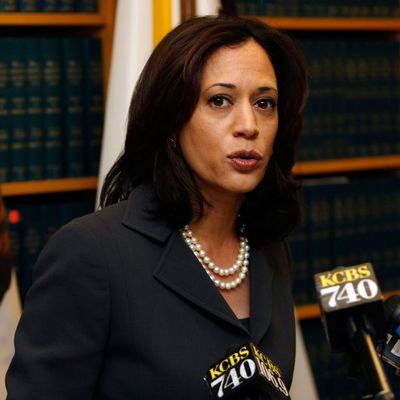
On the “invisible primary” campaign trail in which actual and potential 2020 presidential candidates strut their preliminary stuff, it’s been an active January for California Senator Kamala Harris. She conducted a brisk bicoastal book tour with national media appearances to accompany the release of her memoir, The Truths We Hold (with a children’s picture book sidecar). She hasn’t announced or set up a formal exploratory committee yet (though rumor has it she might do so in conjunction with the Martin Luther King Jr. holiday), but she’s already decided to locate her campaign headquarters in Baltimore, and is acting like a candidate in every possible way.
But perhaps the most convincing token of her proto-candidacy is that she’s getting blasted by progressive voices for her record as a prosecutor in San Francisco and Sacramento, reflecting the problems this putative “unity candidate” could have with the Democratic Party’s increasingly powerful left flank. In a New York Times op-ed, Lara Bazelon, a law professor and criminal justice reform activist from Harris’ home state, didn’t mince words:
Time after time, when progressives urged her to embrace criminal justice reforms as a district attorney and then the state’s attorney general, Ms. Harris opposed them or stayed silent. Most troubling, Ms. Harris fought tooth and nail to uphold wrongful convictions that had been secured through official misconduct that included evidence tampering, false testimony and the suppression of crucial information by prosecutors.
Much of Bazelon’s indictment of Harris covers ground familiar to those who follow California politics and are familiar with long-standing grievances progressives have held against the junior senator during her steady rise to state and then national prominence. But there were some jarring details, too:
Ms. Harris also championed state legislation under which parents whose children were found to be habitually truant in elementary school could be prosecuted, despite concerns that it would disproportionately affect low-income people of color.
This is a direct attack on Harris’ credibility as a symbol of progressive diversity (she has a Jamaican father and an Indian mother) just before a campaign in which her ability to build a base among minority voters is crucial to her prospects. As Jamilah King notes, there could be a lot more flak where that came from:
As a woman of color, she embodies two key Democratic constituencies, and she is beloved by the wing of the party that broke for Hillary Clinton. But among those on the far left, including many die-hard Bernie Sanders supporters, she’s an object of disdain, a Hillary-bot with weak progressive credentials. While that segment of the left might oppose anyone who isn’t one particular septuagenarian, the Week summed up this critique when it slammed Harris for her “rather Hillary Clinton-esque tendency to say the right thing but not follow through.”
So at a minimum Harris will have to walk a tightrope wherein she addresses concerns about her record without looking like she’s repudiating her own career or aligning herself with people who favor more radical steps to dismantle rather than simply “reform” the criminal justice system. That won’t be easy.
Harris is not, of course, alone in possessing “baggage” that will attract criticism from within her own party and intense media scrutiny. Joe Biden famously has enough baggage to derail a train’s luggage car. Critics of Bernie Sanders always suspected that conservatives built a massive oppo research file on the Vermont socialist that they would have pushed with hundreds of millions of dollars of negative “stories” and ads had he won the 2016 Democratic presidential nomination, matching or exceeding the damage they did to Hillary Clinton. Elizabeth Warren has struggled to overcome the stupid but pervasive “Pocohontas” taunt, along with persistent (if probably sexist) doubts about her “likability.” Cory Booker’s past links with Wall Street and support for private school vouchers will be a problem for him. Both Beto O’Rourke and Kirsten Gillibrand are vulnerable to the kind of “flip-flopper” charges that tend to undermine voter trust. And Amy Klobuchar’s history of high staff turnover has spurred rumors about her personality and temperament.
Nobody’s perfect, of course, and presidential candidates – notably the 2016 winner – have overcome heavy baggage before. But the sheer size and volatility of the 2020 Democratic field could amplify internecine sniping considerably, to the particular detriment of candidates hoping to consolidate party-wide support before or after voters begin voting. Maybe heavy attacks like those hitting Harris now will subside over time, but they could leave portions of the party electorate with enduring if not eradicable negative feelings.
But far and away the most important reason Democrats need to think about this issue is that they face an opponent who is more than willing to use intraparty criticisms of this or that candidate – even those emanating from the ideological left – in an uninhibited way, as he showed against Clinton in attacking her for positions most Republicans took (supporting the Iraq War, for example) or for rhetoric he shared or exceeded (the lock-em-up message surrounding the 1994 crime bill). Given President Trump’s reasonably clear 2020 strategy of building a rock-solid base in the minority of voters who like him and then destroying his opponent with relentless attacks that drain otherwise sympathetic electoral support, every chink in a Democratic candidate’s armor is going to be exploited.
So it’s best for Democrats to deal with the baggage now rather than later, and to deal with it in a manner that reflects constant recognition that none of it matters remotely as much as the sins of commission and omission Donald Trump commits five times an hour, as a matter of principle and nefarious inclination. He’s not just the wolf at the door. He’s the wolf in the White House.






























